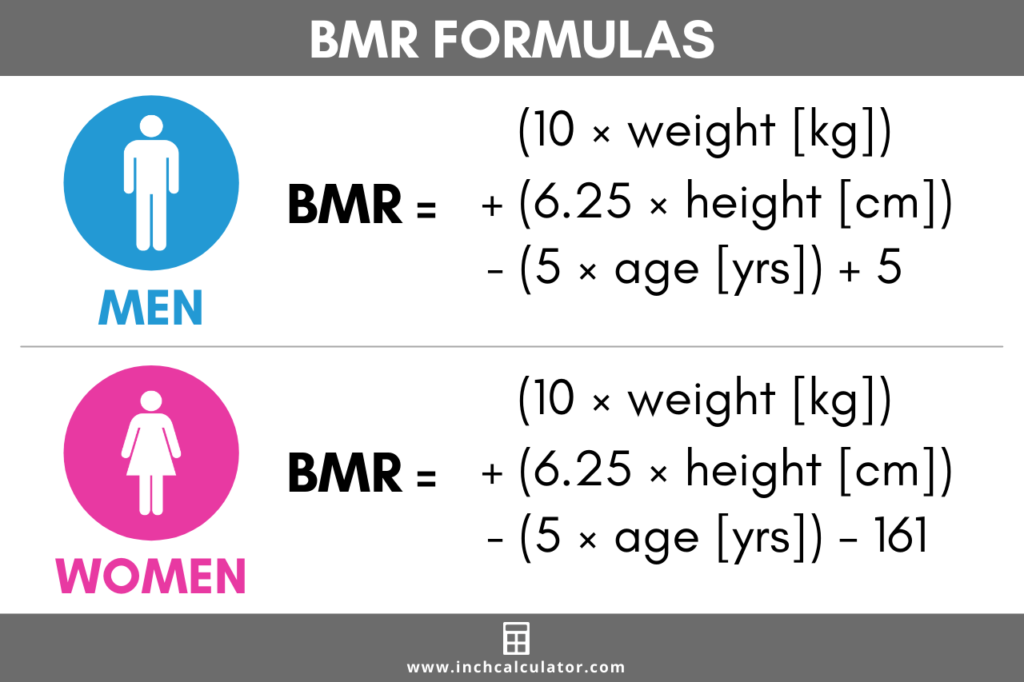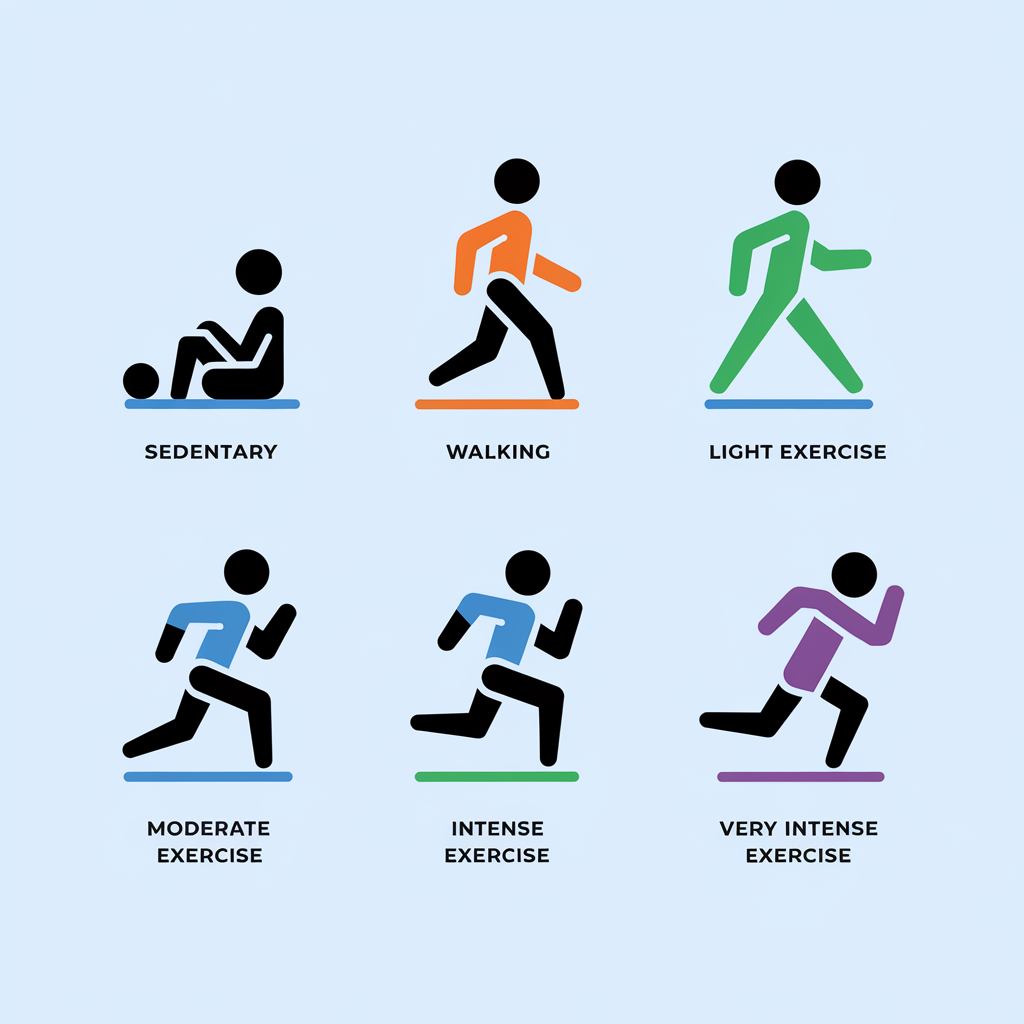BMR Calculator: Discover Your Body’s Base Calorie Burn Rate
Frustrated with diet plans that don’t work for your body?
Many people follow generic nutrition advice that ignores their unique metabolic needs, leading to poor results and wasted effort.
Our BMR Calculator solves this by calculating your specific basal metabolic rate—showing exactly how many calories your body burns at rest—so you can tailor your nutrition plan to your actual needs rather than following one-size-fits-all advice.
BMR Calculator
BMR = ? Calories/day
Daily Calorie Needs = ? Calories/day
Mifflin-St Jeor Equation:
This formula calculates BMR based on weight, height, age, and gender. It’s widely regarded for its accuracy in modern populations. For men, it adds a small constant; for women, it subtracts one, reflecting metabolic differences.
Revised Harris-Benedict Equation:
An updated version of the original Harris-Benedict formula, it also uses weight, height, age, and gender. Although slightly older, it provides a similar estimate of BMR and is still commonly used, though many now prefer Mifflin-St Jeor for its improved precision.
Katch-McArdle Formula:
This equation differs by incorporating body fat percentage to calculate lean body mass. It’s particularly useful for individuals who know their body composition, as it adjusts the BMR based on the proportion of fat-free mass, potentially offering a more personalized estimate.
| Activity Level | Description | Calorie Multiplier |
| Sedentary | Little or no exercise | 1.2 |
| Lightly Active | Light exercise or sports 1-3 days a week | 1.375 |
| Moderately Active | Moderate exercise or sports 3-5 days a week | 1.55 |
| Very Active | Hard exercise or sports 6-7 days a week | 1.725 |
| Extra Active | Very hard exercise, physical job, or training twice a day | 1.9 |
Understanding Basal Metabolic Rate (BMR): How Your Body Burns Calories at Rest
Use our BMR Calculator to find out how your body burns calories whilst resting
What is Basal Metabolic Rate (BMR)?
BMR represents the energy your body uses to perform basic life functions while completely at rest. Think of it as your body’s “standby mode” – the calories needed for:
- Basic breathing and blood circulation
- Cell growth and repair
- Brain and nervous system activity
- Body temperature control
- Nutrient processing
Most people find it surprising that BMR makes up 60-75% of total daily calorie use.
This means your body burns most of its calories just keeping you alive, regardless of how much you exercise!
The Science of BMR Explained

When we measure BMR in lab settings, we look at oxygen use and carbon dioxide output to calculate energy burn. For accurate readings, we need:
- Complete physical rest
- Neutral room temperature
- Fasting state (12+ hours)
- No recent exercise
Every cell in your body demands energy continuously. Your muscles, organs, and tissues all contribute to this baseline energy use. This makes BMR a true measure of your metabolic health.
Related Calculators
Enhance your health and fitness insights with these useful calculators:
- BMI Calculator – Find out if your weight is in a healthy range based on your height.
- Age Calculator – Quickly determine your exact age in years, months, and days.
- Percentage Calculator – Easily calculate percentage changes, discounts, and more.
- ISA Calculator – Plan your savings and investments efficiently.
- AER Calculator – Understand the annual equivalent rate (AER) of your savings.
- Target Heart Rate Calculator – Find your optimal heart rate
Check out more tools at CalculatorLord.com to optimize your calculations!
How BMR Helps Weight Management
Let’s look at a real-life use case.
Let’s imagine a lady called Lisa is exercising 5 days a week, but doesn’t lose weight.
Let’s imaging that Lisas BMR was 1350 Calories a day, you can then use the exercise and calorific intake to figure out if she is in a calorie deficit or surplus for the day.
This highlights why knowing your BMR transforms fitness results:
- It establishes your calorie baseline
- It helps create realistic weight goals
- It protects against extreme restriction
- It explains plateau periods
Without knowing your BMR, you’re basically guessing about calorie needs.
BMR Calculation Methods

While lab testing provides the most accurate BMR measurement, these formulas give good estimates:
Popular BMR Formula Options
Over the years, scientists have developed several equations to estimate BMR without expensive equipment.
The Mifflin-St Jeor Equation
For men:
BMR = (10 × weight in kg) + (6.25 × height in cm) – (5 × age in years) + 5
For women:
BMR = (10 × weight in kg) + (6.25 × height in cm) – (5 × age in years) – 161
I recommend this formula for most people because research shows it matches actual energy use most closely across different body types.
The Modified Harris-Benedict Equation
For men:
BMR = 88.362 + (13.397 × weight in kg) + (4.799 × height in cm) – (5.677 × age in years)
For women:
BMR = 447.593 + (9.247 × weight in kg) + (3.098 × height in cm) – (4.330 × age in years)
This classic formula still sees wide use in medical settings despite being older.
The Katch-McArdle Formula
BMR = 370 + (21.6 × lean body mass in kg)
For people who know their body fat percentage, this formula gives let’s you figure out your personal calorific intake needed to lose or gain weight.
What Affects Your BMR?

Body Composition: Muscle tissue burns about 5-7 times more calories than fat tissue. This explains why strength training boosts long-term metabolism.
Age: BMR typically drops 1-2% each decade after age 20 due to natural muscle loss and hormonal shifts.
Gender Differences: Men generally maintain higher BMRs because of greater average muscle mass and different hormonal profiles.
Genetic Factors: Family patterns in metabolism exist, with research suggesting inherited factors affect BMR by up to 10%.
Thyroid Function: Thyroid hormones directly regulate metabolic rate, while insulin, cortisol, and sex hormones also impact energy regulation.
Temperature: Cold or hot environments temporarily raise metabolism as your body works to maintain core temperature.
Health Status: Various medical conditions and medications significantly affect metabolic function.
BMR vs. RMR: Key Differences
People often mix up these terms, but they mean slightly different things:
Basal Metabolic Rate (BMR) measures energy use under strict laboratory conditions – complete rest, neutral temperature, fasting state.
Resting Metabolic Rate (RMR) measures energy use under normal resting conditions – relaxed but not sleeping, room temperature, not right after eating.
For practical purposes, RMR runs about 10-20% higher than true BMR. Most online “BMR calculators” actually calculate RMR, which better matches real-world resting calorie burn.
Ways to Improve Your Metabolic Rate
Based on tracking client results over years, these strategies show real impact on metabolic health:
Add Muscle Through Strength Training: Even small muscle gains significantly boost daily calorie burn. Two weekly strength sessions can make measurable differences.
Eat Enough Protein: Your body uses more calories digesting protein (20-30% of protein calories) compared to carbs (5-10%) or fats (0-3%).
Stay Properly Hydrated: Research links proper hydration to optimal metabolic function, with some studies showing cold water temporarily raises metabolism.
Prioritize Quality Sleep: Sleep deprivation disrupts hormonal balance, potentially dropping BMR by 5-20% while increasing hunger signals.
Try HIIT Workouts: High-intensity interval training creates an “afterburn effect” that keeps metabolism elevated for up to 24 hours after exercise.
Reduce Chronic Stress: High cortisol levels promote fat storage and muscle breakdown, negatively affecting metabolic health.
Move Throughout Your Day: The small movements you make all day (standing, fidgeting, walking) can account for hundreds of calorie differences between individuals.
Using BMR to Plan Your Diet and Exercise

Once you know your BMR, multiply it by an activity factor to find your Total Daily Energy Expenditure (TDEE):
- Minimal activity (desk job, no exercise): BMR × 1.2
- Light activity (light exercise 1-3 days/week): BMR × 1.375
- Moderate activity (moderate exercise 3-5 days/week): BMR × 1.55
- High activity (hard exercise 6-7 days/week): BMR × 1.725
- Extreme activity (physical job + intense exercise): BMR × 1.9
This TDEE estimate gives you a starting point for nutrition planning:
For maintaining weight: Eat calories equal to your TDEE
For losing weight: Create a moderate deficit (usually 500 calories below TDEE)
For gaining muscle: Eat a slight surplus (usually 300-500 calories above TDEE)
The best approach involves tracking both what you eat and your actual results, then adjusting based on how your body responds. Remember that extended calorie restriction causes metabolic adaptation, so periodic diet breaks help maintain metabolic health.
The Power of Metabolic Knowledge
Understanding your BMR goes beyond knowing a number – it gives you insight into your body’s unique energy system. This knowledge lets you make smart decisions about food and exercise rather than following generic advice that might not fit your metabolism.
Your metabolic rate isn’t just something you inherit; it responds to your lifestyle choices. By applying energy balance principles based on your personal metabolic profile, you can build sustainable approaches to reaching and maintaining your health goals.
I suggest calculating your BMR using one of the equations above, then watching how your body responds to different calorie levels and activity patterns. This personalized energy approach forms the foundation of effective, sustainable body composition management.
FAQ – Questions on BMR
Will smaller, more frequent meals boost my metabolism?
Research doesn’t support this common belief. Your total daily calories matter more than how often you eat them.
Does metabolism automatically slow with age?
Age-related metabolic decline comes mainly from decreased activity and muscle loss, not aging itself. Maintaining muscle through resistance training greatly minimizes this effect.
Can certain foods or supplements significantly raise metabolism?
While some compounds (caffeine, certain spices) have small, temporary effects, these typically only burn an extra 20-100 calories daily – minor compared to building muscle or increasing overall activity.
How accurate are BMR calculators?
Even the best formulas typically have a margin of error around ±10%. For greater precision, professional indirect calorimetry testing provides the most accurate assessment of your resting energy use.
How does calorie cutting affect BMR?
Long periods of severe calorie restriction can lower BMR beyond what would be expected from weight loss alone – a phenomenon called adaptive thermogenesis. This explains why gradual, moderate approaches to weight loss tend to work better long-term.
Conclusion on our BMR Calculator
As you can see, BMR can be a tricky subject.
Hopefully you can use our BMR Calculator to be able to get scientific about your weight loss or gain.
